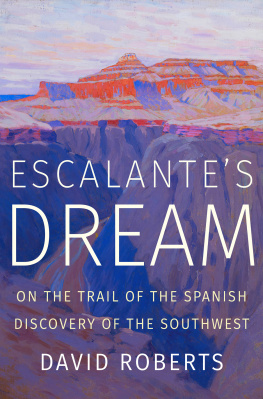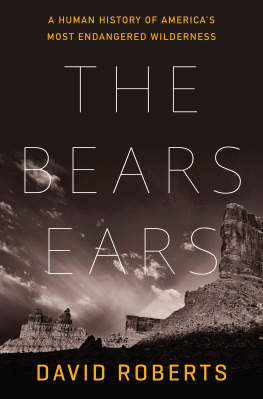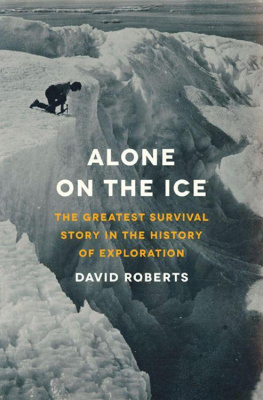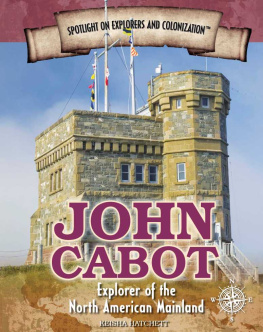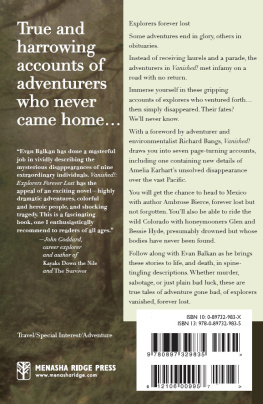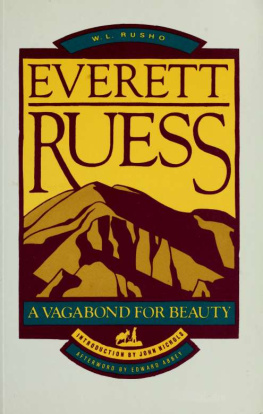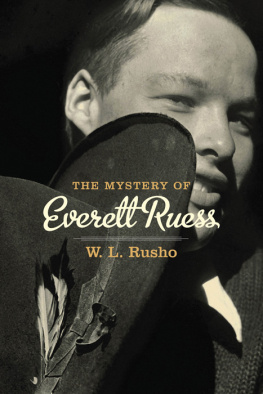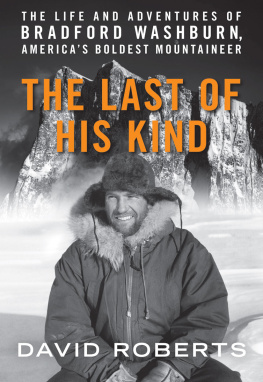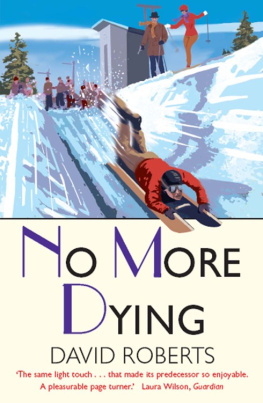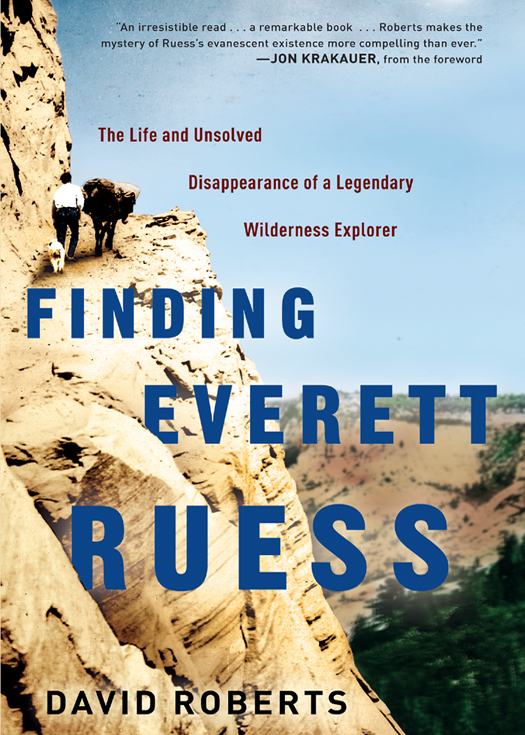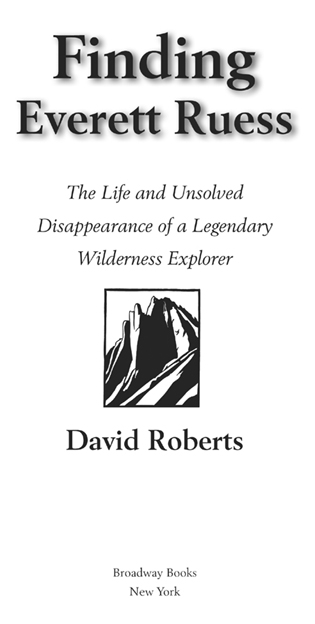Finding Everett Ruess
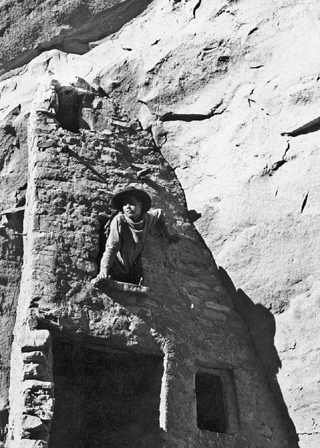
ALSO BY DAVID ROBERTS
The Mountain of My Fear
Deborah: A Wilderness Narrative
Great Exploration Hoaxes
Moments of Doubt
Jean Stafford: A Biography
Iceland: Land of the Sagas (with Jon Krakauer)
Mount McKinley: The Conquest of Denali
(with Bradford Washburn)
Once They Moved Like the Wind: Cochise, Geronimo, and the Apache Wars
In Search of the Old Ones: Exploring the Anasazi World of the Southwest
Escape Routes
The Lost Explorer: Finding Mallory on Mount Everest
(with Conrad Anker)
A Newer World: Kit Carson, John C. Frmont, and the Claiming of the American West
True Summit: What Really Happened on the Legendary Ascent of Annapurna
Escape from Lucania: An Epic Story of Survival
Four Against the Arctic: Shipwrecked for Six Years at the Top of the World
The Pueblo Revolt: The Secret Rebellion That Drove the Spaniards Out of the Southwest
On the Ridge Between Life and Death:
A Climbing Life Reexamined
Sandstone Spine: Seeking the Anasazi on the First Traverse of the Comb Ridge
No Shortcuts to the Top: Climbing the Worlds 14 Highest Peaks (with Ed Viesturs)
Devils Gate: Brigham Young and the Great Mormon Handcart Tragedy
The Last of His Kind: The Life and Adventures of Bradford Washburn, Americas Boldest Mountaineer
K2: Life and Death on the Worlds Most Dangerous Mountain (with Ed Viesturs)
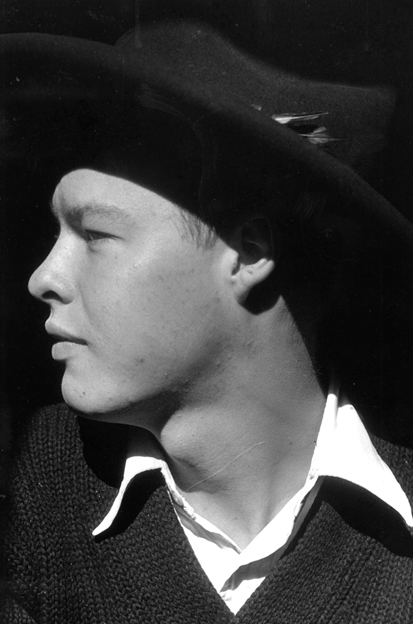

Copyright 2011 by David Roberts
Foreword copyright 2011 by Jon Krakauer
All rights reserved.
Published in the United States by Broadway Books, an imprint of the Crown Publishing Group, a division of Random House, Inc., New York.
www.crownpublishing.com
BROADWAY BOOKS and the Broadway Books colophon are trademarks of Random House, Inc.
Grateful acknowledgment is made to the Special Collections, J. Willard Marriott Library, University of Utah, for permission to reprint text from the Ruess Family Papers; excerpts from letters, diaries, and essays by Everett Ruess; excerpts from correspondence, essays, and diary notations by Christopher, Stella, and Waldo Ruess; and excerpts of correspondence from others to the Ruesses.
Grateful acknowledgment also to Michle Ruess, for permission to quote from diaries, essays, and letters belonging to the Ruess family.
The Utah State Historical Society kindly granted permission to quote from the papers of Harry LeRoy Aleson.
The blockprints at the head of each chapter are reproduced from originals by Everett Ruess.
Library of Congress Cataloging-in-Publication Data
Roberts, David.
Finding Everett Ruess/David Roberts.1st ed.
p. cm.
1. Ruess, Everett, b. 1914. 2. Poets, American20th centuryBiography. I. Title.
PS3535.U26Z78 2011
811.52dc22
[B] 2011008379
eISBN: 978-0-307-59178-4
Maps by Jeffrey L. Ward
Jacket design by David Tran
Front cover photograph courtesy of
the University of Utah, J. Willard Marriott Library,
Special Collections Department
v3.1
To the memory of Stella, Christopher, and Waldo Ruess
Who loved Everett without qualification,
And who spent the rest of their days keeping his flame alive
Wherever poets, adventurers and wanderers of the Southwest gather, the story of Everett Ruess will be told. His name, like woodsmoke, conjures far horizons.
Hugh Lacy, 1938
CONTENTS
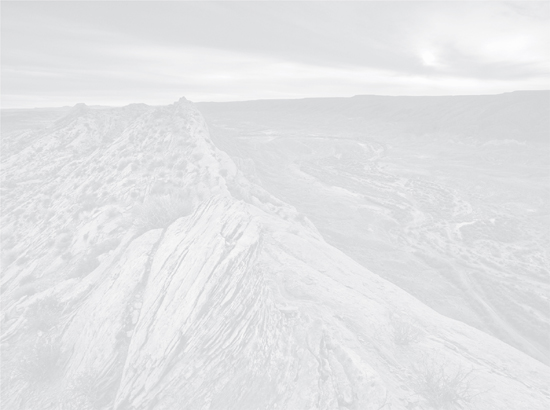
F OREWORD BY
J ON K RAKAUER

In the spring of 1992, a twenty-four-year-old man from suburban Washington, D.C., seeking self-knowledge and a meaningful challenge, hitchhiked to Alaska and walked into the wilderness to live off the land. His name was Chris McCandless. As one of his last acts before heading into the bush alone, he mailed a postcard to a friend that cheerfully declared,
Greetings from Fairbanks! This is the last you shall hear from me Wayne. Please return all mail I receive to the sender. It might be a very long time before I return South. If this adventure proves fatal and you dont ever hear from me again, I want you to know youre a great man. I now walk into the wild.
Four months later, when McCandlesss emaciated remains were discovered by moose hunters near the northern boundary of Denali National Park, Outside magazine assigned me to write an article about the tragedy, which I subsequently expanded into a book that was published in 1996 as Into the Wild. In the summer of 1993, while immersed in the research for the book, I was chatting about the project with David Roberts when he remarked, You know, McCandless sounds a lot like Everett Ruess
Uh, whos Everett Ruess? I sheepishly inquired. Appalled at my ignorance, Roberts commanded me to get my hands on a copy of Everett Ruess: A Vagabond for Beauty, a collection of Ruesss letters and diary entries edited by W. L. Rusho, which had been published ten years earlier. As soon as I hung up the phone, I hurried out to my local bookstore and bought a copy, then stayed up the rest of the night reading it. By the time the sun came up I realized that Roberts was absolutely right: A number of the parallels between Ruess and McCandless were extraordinary.
Ruess disappeared in 1934, at the age of twenty, while on a solo trek through the red-rock canyon country of southern Utahat the time a daunting expanse of wilderness imbued with a mystique comparable to that of present-day Alaska. Like McCandless, he was an idealist and a romantic. Both men felt a passionate attraction to risky endeavors in untrammeled landscapes. Here, for example, are two sentences from a postcard McCandless wrote while paddling alone down the Colorado River, sixteen months before embarking on his fatal Alaskan adventure:
Ive decided that Im going to live this life for some time to come. The freedom and simple beauty of it is just too good to pass up.
And here are a couple of lines from a letter Ruess sent in November 1934, shortly before he vanished without a trace:
As to when I shall visit civilization, it will not be soon, I think. I have not tired of wilderness; rather I enjoy its beauty and the vagrant life I lead, more keenly all the time.
The uncanny resonance between these and other bits of writing by the two young adventurers was so arresting that a week after learning about Ruess from Roberts, I drove 1,200 miles from my home in Seattle to the headwaters of an obscure ravine called Davis Gulch, the site of Ruesss last known camp. For most of its four-mile length, as I later described the defile in


